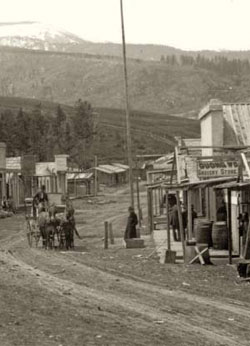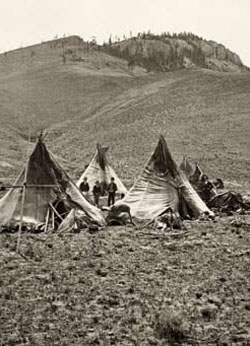Montana: Stories of the Land
Companion Website and Online Teacher's Guide
Chapter 6 - Montana's Gold and Silver Boom, 1862-1893
Chapter 1 - Montana: Where the Land Writes History
Chapter 2 - People of the Dog Days
Chapter 3 - From Dog Days to Horse Warriors
Chapter 4 - Newcomers Explore the Region
Chapter 5 - Beaver, Bison, and Black Robes
Chapter 6 - Montana's Gold and Silver Boom
Chapter 7 - Two Worlds Collide
Chapter 8 - Livestock and the Open Range
Chapter 9 - Railroads Link Montana to the Nation
Chapter 10 - Politics and the Copper Kings
Chapter 11 - The Early Reservation Years
Chapter 12 - Logging in the "High Lonesome"
Chapter 13 - Homesteading This Dry Land
Chapter 14 - Towns Have Lives, Too
Chapter 15 - Progressive Montana
Chapter 16 - Montana and World War I
Chapter 17 - Montanans on the Move
Chapter 18 - The Great Depression Transforms Montana
Chapter 19 - World War II in Montana
Chapter 20 - Building a New Montana
Chapter 21 - A People's Constitution
Chapter 22 - Living in a New Montana
Learning From Historical Documents
Letter from E.W. Knight to U.S. Attorney General, February 7, 1882. Edward W. Knight letters, 1882. Small Collection 946. Montana Historical Society Research Center. Archives. Excerpted in Not In Precious Metals Alone: A Manuscript History of Montana (Helena, 1976): 158.
Context for E. W. Knight's Letter:
Western immigrants brought their prejudices with them. In Helena, the issue of integrating the public schools prompted school board member E. W. Knight to request an opinion from the U.S. Attorney General. Perhaps Knight's inquiry stemmed from a sense of fairness or from the political realities of his forthcoming campaign for mayor. Whatever the cause or the reply, Knight won the election and Helena residents voted that spring to integrate their schools.
About Primary Sources:
Letters, diary entries, census records, newspapers, and photographs are all examples of "primary sources," material created at a particular moment in the past that has survived into the present. Primary sources can provide clues to the past. They are our windows into an earlier time. The Montana Historical Society contains thousands of primary sources. In the 1970s, archivists collected just a few snippets into a book, which they called Not in Precious Metals Alone: A Manuscript History of Montana. That book is now on the web in its entirety. The above sample from that book relates directly to this chapter.


